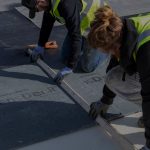What is the best roof sheathing?

What is the best roof sheathing?
There is no simple answer to what the best roof sheathing is. Plywood, OSBs and cementitious and gypsum core cover boards are the most frequently specified roof sheathing products. The site characteristics, available resources and crucially, the design objectives of a project will help shape the specification of the sheathing type for a development. These are the leading roof performance criteria that can be improved through roof sheathing specification:
- Weather protection
- Mould resistance
- Fire resistance
- Exterior system compatibility
- Construction efficiency
- Noise attenuation
- Extend roof systems design life and reduce maintenance requirements
This blog will focus on the benefits of gypsum core cover boards. We will look closely at the different types of gypsum core cover boards available on the market and compare specific performance markers such as strength and durability, moisture resistance, wind uplift resistance. We will also consider the commercial implications of gypsum cover board specification.
How can gypsum core cover board help improve roof performance in challenging weather conditions?
Plywood, OSB and gypsum core cover boards can increase the dimensional stability of a roof system. However, plywood and OSB have limited resistance to moisture and moisture vapours without additional weatherproofing treatment. Both boards require priming and sanding to ensure compatibility with adhered and semi-adhered roof membranes.
Cementitious cover boards can offer improved material compatibility with roofing membranes. However, cement boards are heavy and difficult to cut. This can mean more deliveries, manoeuvrability challenges on site and additional strain on labour and resources on site. Most cement cover boards absorb moisture. This might need to be taken into consideration because of the additional weight loading this could pose on the structure.
In contrast, DensDeck® Prime Roof Board with EONIC® Technology are designed to resist moisture and may offer protection from moisture ingress. The performance of specific gypsum core board may differ by manufacturer.
Strength and durability of gypsum core cover boards
Tests were conducted in October 2016 by Trinity ERD in Columbia, South Carolina, on three types of gypsum cover boards. A ½ inch (12.7mm) gypsum fibre cover board, a glass fibre mat gypsum cover board by Georgia-Pacific – the DensDeck® Prime Roof Board with EONIC® Technology, and the third was an alternative coated glass mat faced gypsum board. The results have shown that the DensDeck® Prime Roof Board with EONIC® Technology is 52% stronger than the gypsum fibre and 57% stronger than alternative coated glass mat gypsum board.
After a standard 2-hour soak test, DensDeck® Prime Roof Board was 87% stronger than alternative mat face gypsum and 267% stronger than a gypsum fibre board. These performance markers show the long-term structural strength and robustness of the boards when incidentally exposed to moisture.
Moisture resistance of gypsum cover boards
The same three gypsum core cover boards were used for a moisture resistance test by PRI Construction Materials Technologies in October 2017 and in accordance with ASTM C473. In the standard 2-hour soak test for absorbency, alternative glass mat facer gypsum boards absorbed 76% more. And gypsum fibre absorbed 132% more water than the DensDeck® Prime Roof Board with EONIC® Technology.
Wind uplift resistance of mat facer gypsum cover boards
The addition of a glass fibre mat facer broadens the compatibility of the DensDeck® Prime Roof Board. The coating primes the cover board for application of various roof adhesives and hot mopped, cold mastic and torch-applied modified bitumen roof systems. This encourages a more uniform and consistent spread of adhesives, ensuring a stronger bond. In adhered, single ply membrane testing done in accordance with FM approvals 4470, DensDeck® Prime Roof Board demonstrated an average of 24% better bond than the original products when using solvent-based adhesives.
The critical mat to core bond strength is also improved. In independent testing conducted by PRI Construction Materials Technologies in October 2017, DensDeck® Prime Roof Board with EONIC® Technology tested in accordance with ASTM C209 averaged 23% stronger on the face and 192% stronger on the back than boards before the enhancement. The increased mat to core and substrate to roof membrane bond can significantly improve the uplift resistance of the whole flat roof system.
What are the commercial implications of cover board specification?
According to FMI Roof Cover Board Survey 2020, roofs with coverboards were nearly twice as likely to meet the owners’ expectation for roof life (86% with vs 52% without). The same survey also showed that single ply roof systems specified with a cover board extend the median life of the system by four years. The operation and maintenance costs are also therefore reduced by approximately £11 per square metre.
We already considered the impact of moisture and wind uplift resistance along with the strength and durability of the DensDeck® Roof Board on the longevity of low slope and flat roof systems. The cover board can also improve the acoustic and fire performance of the roof build up. The low weight and the relatively easy installation that doesn’t require specialist tools are crucial is construction efficiency is critical for the success of your project.
To find out more about the fire performance of DensDeck® Roof Boards and the benefits for your next project, contact us.
Testing was done in accordance with FM approvals 4470, Appendix C: Small Scale Tests, Membrane
Delamination Tests for Roofing Membranes and Substrates Using Tensile Loading
Contact Us
Start your project or simply get specification advice by dropping us a message.
One of our team will be in touch as soon as possible.